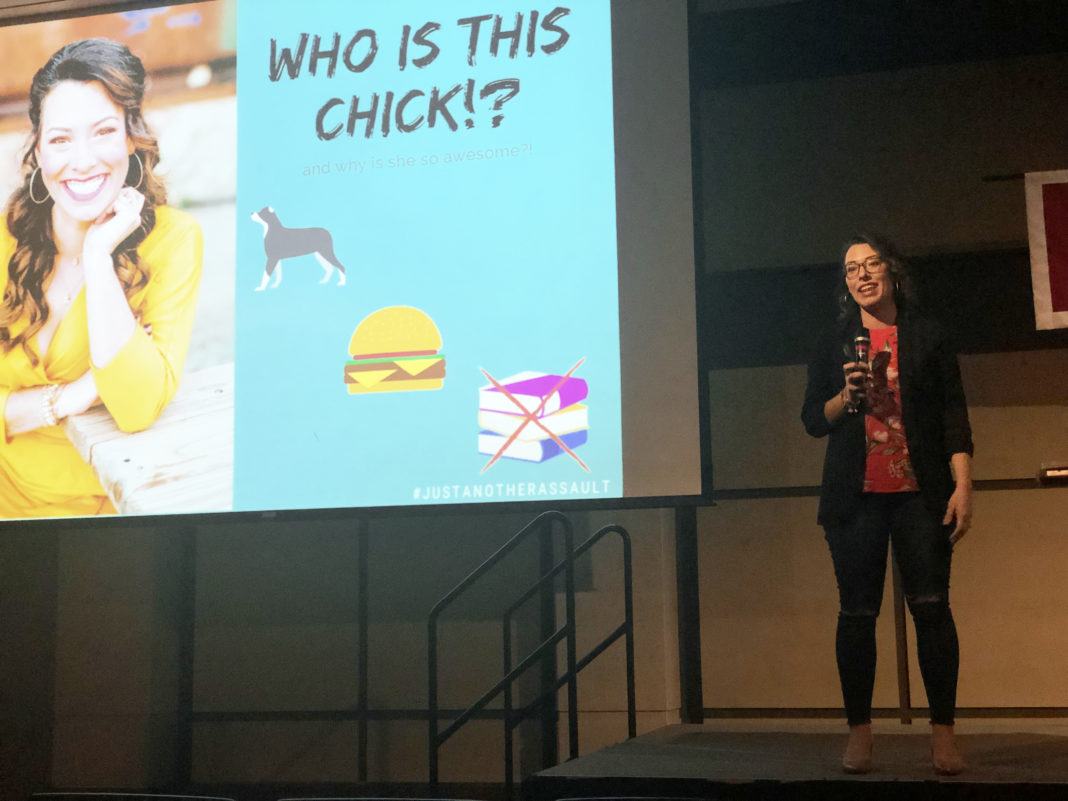When Bonny Shade entered the stage of Miller’s Forum on the evening of Monday, April 1 for her talk “Just Another Assault: An In-Depth Look at Issues Surrounding Assault, Rape Culture and Healing,” she started out by challenging the crowd to think differently about their preexisting assumptions surrounding sexual assault. She looked into the rows of students and graciously thanked everyone for being there, and then proceeded to present them with a pop quiz.
This “quiz” involved Shade displaying a sentence on the projector screen, and then told the audience that they would have 10 seconds to count the number of times they spotted the letter “f.” While the correct number of times this letter appeared was revealed to be six, a good portion of people only saw it three times, due to the fact that, as Shade explained, our brains create synapses: shortcuts to allow us to go through complex tasks in simplistic ways. In other words, most people were not reading the full sentences, often skipping over words to try to complete the timed task as quickly as possible.
She then proceeded to connect this seamlessly trivial pop quiz to the broader issue of discussing sexual assault.
“We need to learn to break our synapses to have more conversations about sexual violence,” Shade proclaimed, alluding to how oftentimes people create shortcuts and do not go into depth with this topic.
“Sexual violence can often feel like it is breaking our communities. It is a topic that is there, but we may not want to address it,”
Shade’s entry into education all began when she read the book and watched the movie Freedom Writers (2007). The story of the teacher having a huge effect on the lives of her students sparked the first light bulb moment in Shade’s life, leading her to switch from being just a Biology Major at Florida Gulf Coast University to an Education and Creative Writing minor. She then had the opportunity to teach high schoolers in Florida about science.
“For 50 minutes a day, six class periods a day, with students between 14-18, I was teaching them about stuff I knew they didn’t care about it,” said Shade. “But, for 50 minutes a day, they got to sit there and be themselves. It was the most amazing year of my life.”
Nonetheless, Shade revealed that there was still some wattage left in her lightbulb, and her work was not yet complete. In 2016, she read the book Missoula: Rape and the Justice System in a College Town by Jon Krakauer, guiding her towards becoming not just an educator, but an educator surrounding sexual assault. More specifically, she began to grapple with her own experience with sexual assault for the first time since it happened.
“I never thought I would care about a global issue until I became a survivor of a global issue,” she said, revealing that it took her nearly seven years to come to terms with what had happened to her.
Shade was sexually assaulted by her best friend, a boy that she knew very well, while she was home one weekend from college. She explained that there is a misconception that perpetrators of sexual assault are often strangers, when in reality, 85 percent of the time it is by someone that you know.
“I never thought I would care about a global issue until I became a survivor of a global issue,”
In addition to her personal experience, she also went into detailed discussions regarding the differences between perception and reality, unwise versus unethical behavior and also the complexities of consent.
“Consent has to be a conversation, especially when alcohol is involved,” she explained.
Shade’s main framework for consent was broken up into an acronym: A.C.E.O, which stands for Active, Conscious, Eager and Ongoing, the characteristics of proper consent.
She also presented an analogy which connected consent with ordering food at Chipotle.
“If you can order Chipotle, you can ask for consent,” she said. “[At Chipotle] they’re not gonna assume just because they ordered brown rice last time that you still want it.”
Just like the constant questions and reassurance that is offered when ordering a burrito or bowl from Chipotle, Shade explained that there should be constant questions and reassurance in relation to consent as well.
Shade also encouraged students to look out for one another, and to use each other as resources.
“When pottery is broken in Japan, the pieces are shattered all over the floor. The artist will collect and put them together using gold. Sexual violence can often feel like it is breaking our communities. It is a topic that is there, but we may not want to address it,” she explained. “I need you to be the gold for each other.”
Since April is Sexual Assault Awareness Month, there will be more programming on-campus in the coming weeks to continue these conversations about consent.






















